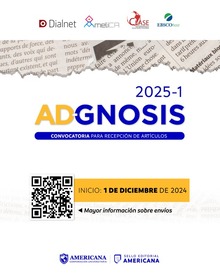Pedagogical proposal for improvement of organizational climate
DOI:
https://doi.org/10.21803/adnogsis.v6i6.196Keywords:
Organizational climate, Adult teaching, Cooperative work, LeadershipAbstract
Enterprise-level organizational climate studies are focused on measuring the climate within the company and conclude the need to improve it in any of its dimensions through strategies of training sessions or workshops with employees. However, these studies rarely speak about the teaching methodology implemented and much less about teaching that should be used to strengthen certain dimension of climate. This research aims to show the effectiveness of a pedagogical strategy to improve the teamwork inside of a telecommunications company, based on the way in which adults learn and through the strengthening of socio-emotional competencies of individuals. The present scientific research with the quantitative approach is born of ordered analysis of the diagnostic tool IMCOC (measurement of organizational climate in Colombia) the questions which arise to solve: ¿What dimensions of the evaluated in the survey IMCOC they can be intervened in a positive manner through the implementation of a teaching and learning strategy? ¿How to articulate the strategy se- lected within the company’s regular training processes.?
Downloads
References
A?lvarez, G. (2003). El clima organizacional en entidades educativas conceptualizacio?n investigaciones y resultados. Bogota?: Interamericana de Psicologi?a Ocupacional.
Amezola, J. J. H., Garci?a, I. S. P. & Castellanos, A. R. C. (2008). Desarrollo curricular por competencias profesionales integrales. Revista Educar, (13).
Argyris, C. (1957). Personality and organization; the conflict between system and the individual.
Atkinson, J. W. (1964). An introduction to motivation.
Cordero, I. (2013). Dida?ctica y ensen?anza del Derecho en las universidades. Pensamiento Americano, 6(11), 29-34.
Cornell, F. G. (1955). Socially perceptive administration. The Phi Delta Kappan, 36(6), 219-223.
Chiavenato, I. (2007). Administracio?n de Recursos Humanos?el capital humano de las organizaciones. 8 ed. Me?xico: Mc- Graw-Hill.
De Zubiri?a Samper, J. (2006). Los modelos pedago?gicos: hacia una pedagogi?a dialogante. COOP. Editorial Magisterio.
Drucker, P. F. (1995). People and performance: The best of Peter Drucker on management. Routledge.
Duque Delgado, M. J. (4 de diciembre de 2009). Javeriana. Recuperado el 5 de marzo de 2012, de http://www.javeriana.edu.co/biblos/tesis/comunicacion/tesis307.pdf
Edvinsson, L. & Malone, M. (1998). El capital intelectual: co?mo intangibles de su empresa. Colombia: Editorial Norma.
Garci?a, N. T., Ochoa, L. E., Procrea, C. O. G. G. C. & Colciencias (2004). Clima organizacional: promotor de la creatividad en la empresa. Revista Creando, 2(3).
Goleman, D. (2012). Inteligencia emocional. Editorial Kairo?s.
Gonczi, A. (1996). Instrumentacio?n de la educacio?n basada en competencias. Perspectivas teo?ricas y pra?cticas en Australia. En Argu?elles, A. (Comp.), Competencia laboral y educacio?n basada en normas de competencia (pp. 265-288). Me?xico
Kolb, D. A. (2014). Experiential learning: Experience as the source of learning and development. FT Press.
Me?ndez A?lvarez, C. E. (2006). Clima Organizacional en Colombia: El IMCOC: Un me?todo de ana?lisis para su intervencio?n. Bogota?: Editorial Universidad del Rosario.
Maturana, H. R. (1990). Emociones y lenguaje en educacio?n y poli?tica. JC Sa?ez Editor.
Michael, A. (1987). La psicologi?a de la felicidad. Madrid: Alianza.
Rousseau, D. (1990). Quantitative assessment of organizational culture: The case for multiple measures. Organizational climate and culture (pp. 153-192). San Francisco: Jossey-Bass.
Ruiz, M. & Moya, R. (1997). Los cuatro acuerdos. Amber Allen Publishing.
Trice, H. & Beyer, J. (1993). The Cultures of work organizations. Englewood Cliffs, Prentice-Hall.
Uribe, A. F. (2010). Estilos de liderazgo, riesgo psicosocial y clima organizacional en un grupo de empresas colombianas. Revista Facultad de Ciencias Econo?micas: Investigacio?n y Reflexio?n, 18(2), 7-17.
Downloads
Published
Versions
- 2023-01-31 (2)
- 2017-12-08 (1)
Issue
Section
License
Copyright (c) 2023 AD-GNOSIS

This work is licensed under a Creative Commons Attribution-NonCommercial-NoDerivatives 4.0 International License.






